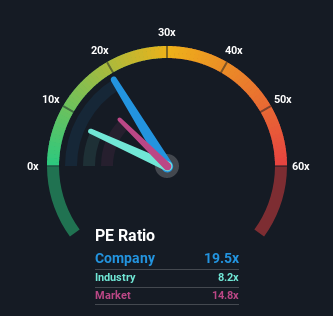The Home Depot, Inc.'s (NYSE:HD) Shares May Have Run Too Fast Too Soon
The Home Depot, Inc.'s (NYSE:HD) price-to-earnings (or "P/E") ratio of 19.5x might make it look like a sell right now compared to the market in the United States, where around half of the companies have P/E ratios below 14x and even P/E's below 8x are quite common. However, the P/E might be high for a reason and it requires further investigation to determine if it's justified.
Recent earnings growth for Home Depot has been in line with the market. One possibility is that the P/E is high because investors think this modest earnings performance will accelerate. If not, then existing shareholders may be a little nervous about the viability of the share price.
Check out our latest analysis for Home Depot
Want the full picture on analyst estimates for the company? Then our free report on Home Depot will help you uncover what's on the horizon.
Is There Enough Growth For Home Depot?
The only time you'd be truly comfortable seeing a P/E as high as Home Depot's is when the company's growth is on track to outshine the market.
If we review the last year of earnings growth, the company posted a worthy increase of 11%. The latest three year period has also seen an excellent 66% overall rise in EPS, aided somewhat by its short-term performance. Accordingly, shareholders would have probably welcomed those medium-term rates of earnings growth.
Looking ahead now, EPS is anticipated to climb by 5.1% per year during the coming three years according to the analysts following the company. Meanwhile, the rest of the market is forecast to expand by 9.0% each year, which is noticeably more attractive.
With this information, we find it concerning that Home Depot is trading at a P/E higher than the market. Apparently many investors in the company are way more bullish than analysts indicate and aren't willing to let go of their stock at any price. There's a good chance these shareholders are setting themselves up for future disappointment if the P/E falls to levels more in line with the growth outlook.
The Final Word
While the price-to-earnings ratio shouldn't be the defining factor in whether you buy a stock or not, it's quite a capable barometer of earnings expectations.
We've established that Home Depot currently trades on a much higher than expected P/E since its forecast growth is lower than the wider market. Right now we are increasingly uncomfortable with the high P/E as the predicted future earnings aren't likely to support such positive sentiment for long. This places shareholders' investments at significant risk and potential investors in danger of paying an excessive premium.
Don't forget that there may be other risks. For instance, we've identified 2 warning signs for Home Depot that you should be aware of.
You might be able to find a better investment than Home Depot. If you want a selection of possible candidates, check out this free list of interesting companies that trade on a P/E below 20x (but have proven they can grow earnings).
Have feedback on this article? Concerned about the content? Get in touch with us directly. Alternatively, email editorial-team (at) simplywallst.com.
This article by Simply Wall St is general in nature. We provide commentary based on historical data and analyst forecasts only using an unbiased methodology and our articles are not intended to be financial advice. It does not constitute a recommendation to buy or sell any stock, and does not take account of your objectives, or your financial situation. We aim to bring you long-term focused analysis driven by fundamental data. Note that our analysis may not factor in the latest price-sensitive company announcements or qualitative material. Simply Wall St has no position in any stocks mentioned.
Join A Paid User Research Session
You’ll receive a US$30 Amazon Gift card for 1 hour of your time while helping us build better investing tools for the individual investors like yourself. Sign up here

 Yahoo Finance
Yahoo Finance 
